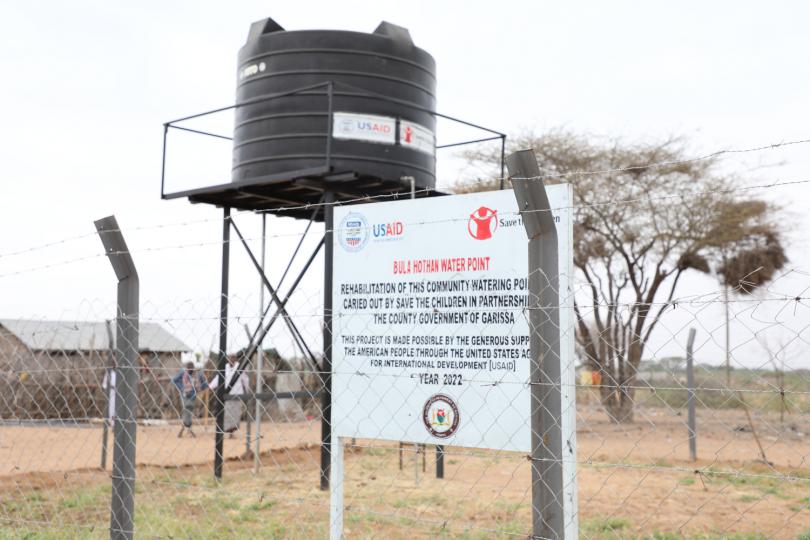BULLA HOTHAN WATER POINT A REPREIVE TO MBALAMBALA COMMUNITY MEMBERS

16- month- old Khatra enjoys some water in the company of her mother. Photo courtesy| Dorothy Waweru, Save the Children
By Dorothy Waweru
In the heart of Balambala sub-county, Garissa County, a little girl named Khatra finds solace in her mother Khadija's loving embrace. The bond between them is unbreakable, but even their tender connection can't shield them from the harsh reality that the relentless drought wreaked havoc on their community.
Khatra, at just 16 months old, is the youngest of eight siblings. Her family's struggles are mirrored across the region. The unforgiving drought that ravaged Northern Kenya left them all in desperate need of relief. Livestock, once a source of sustenance and livelihood, suffered the most and Khadija was left with only a handful of animals.
"I used to rely on my goats for milk and a source of income, but now they are just like babies, needing constant care to survive," Khadija laments. The drought's double blow threatened both human and animal life.
The scarcity of food and water made life unbearable for the entire community, particularly for the women and children who must embark on treacherous journeys to fetch water from a distant and dangerous river. Khadija recalls the fear they faced as they encountered crocodiles and hippos while collecting water from the murky river, which often made them sick.
Save the Children rehabilitated and solarized Bulla Hothan water point, offering a lifeline to the thirsty and suffering community, among them Khadija’s household. Khadija's cannot hide her relief as she describes the reprieve the clean and safe water has brought to her household.

Bulla Hothan waterpoint.
Abdirizak Ibrahim, the WASH Officer from Save the Children, shares the impact of the project. He explains how the previously unsafe water threatened the health of the community, but now, with the solar-powered water point, they have access to safe and clean water, easing the burden of disease.
“With solar panels installed, the water point becomes a reliable and sustainable source of clean and safe water. The community does not have to worry about expensive diesel and long treks to fetch water.” Explains Ibrahim.
“I thank those who have brought clean water to us and I pray for the communities still struggling to access clean water to be relieved from this struggle one day. As a community, we have ensured that the water point is secured and we have employed a security person to guard this precious resource so that in future our children will benefit from it too.” Khadija says.
Save the Children with funding from USAID’s Bureau of Humanitarian Assistance conducted a major water borehole rehabilitation in Garissa County. This involved the installation of solar panels replacing the diesel-powered generator with solar. This upgrading of diesel-powered boreholes to solar-powered ones eliminates the need for frequent repairs of genesets and the purchase of diesel that further impoverishes the communities.
Save the Children has also invested in the construction of additional water troughs at water points for animal use and pipeline extension to the villages.